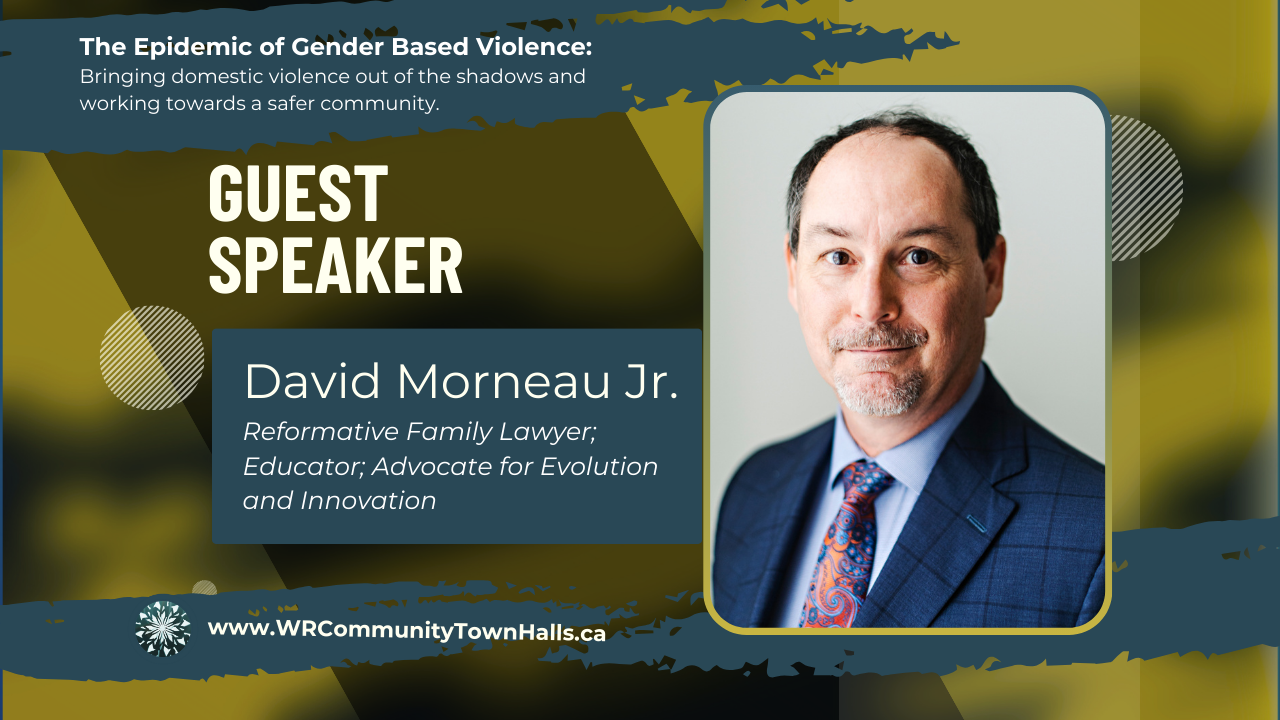|
|
The Epidemic of
|
|
For over 20 years, David has practised law with empathy, compassion and integrity, helping families through challenging circumstances with considerable care. He applies innovation and creativity in assisting clients in determining what they need to overcome the obstacles they are facing, empowering them to do so with dignity, honour and a focus on the future and communication, ensuring that they have all information and advice to make informed decisions.
|
His contributions include:
- Presenter of “Collaboration and Working with Victims and Survivors of Human Trafficking” for Ontario Association of Family Mediators (Child Protection);
- Commentary on changes to the Children’s Law Reform Act, including the definition of family violence, for local politicians;
- Various podcasts, including “Navigating Through Separation and Divorce and Domestic Violence” for Women’s Crisis Services of Waterloo Region;
- Appearances on CBC Tonight and CTV Your Morning discussing changes to the Divorce Act;
- Educational content including “Navigating Separation and Divorce” for Women’s Crisis Services of Waterloo Region and YWKW and “Changes to the Divorce Act -- What front-line workers need to know to support their clients” for Connecting Ottawa.
|
|
Throughout his career, David has observed and analyzed our legal systems and has spoken widely about reform and change. He has acted as counsel for parents and children in the family justice system and was able to witness firsthand the impact that adversarial processes can have on families in transition. Through his training, he continues to learn new skills for conflict resolution which give the participants the ability to listen, communicate, solve their own differences, both now and in the future.
|
Presentation Footage
|
|
Presentation Slides
|
|
Slides above provided by guest speaker David Morneau Jr.
The Crucial Intersection of Family Violence & Family Courts: David Morneau
David Morneau, with nearly 25 years of experience as a family lawyer, addresses the intersection of family law and family violence, emphasizing the need for reform and innovation within the legal system. He begins by outlining the recent legislative developments that have provided a more expansive definition of family violence, incorporating not just physical abuse but also psychological, financial, and coercive control aspects.
Morneau points out that before these legislative changes, the recognition of family violence in family law often depended on tangible evidence like police reports or medical records. The new definitions in federal and provincial laws now acknowledge a broader spectrum of abusive behaviours. This change marks a significant shift in understanding and addressing family violence in the context of family law.
Highlighting a critical gap in the legal system, Morneau notes that unlike accredited family mediators and collaborative professionals, lawyers operating within the court system are not required to undergo extensive training in intimate partner violence and coercive control. This discrepancy, he argues, is a significant deficiency that needs correction, especially given the high emotion and conflict nature of court cases involving family violence.
Morneau also discusses the impact of Keira's Law, named after a young victim of family violence, which now requires judges to have current and ongoing training in intimate partner violence and coercive control. He underscores the importance of this law by citing cases with clear red flags that were previously overlooked due to gaps in training and awareness.
In his advocacy for a safer justice system, Morneau calls for comprehensive education and planning for all professionals within the family justice system. He stresses the need to understand the complex dynamics of family violence to provide better support and protection for victims. Morneau concludes by emphasizing the potential for collaborative family law processes to address family violence effectively, highlighting the expertise of professionals trained in intimate partner violence and coercive control outside the court system. His presentation underscores the need for a more informed, sensitive, and proactive approach to family violence within the family law context.
- New Legal Definitions of Family Violence: David Morneau discusses the introduction of comprehensive definitions of family violence in the Divorce Act and the Children's Law Reform Act, acknowledging not only physical but also psychological, financial, and coercive control aspects of violence.
- The Need for Reform in Family Law: Morneau emphasizes the necessity for reform and innovation in family law, particularly in the context of family violence and its recognition within the legal system.
- Training Gaps in the Legal Profession: A striking point is the lack of required intimate partner violence and coercive control training for lawyers in the court system, contrasted with the requirements for family mediators and collaborative professionals.
- Keira's Law and Judicial Training: Morneau highlights the significance of Keira's Law, which mandates ongoing training for judges in intimate partner violence and coercive control, inspired by tragic cases that underscored gaps in the system.
- Advocacy for Comprehensive Education and Planning: Morneau advocates for comprehensive education and thoughtful planning for all professionals within the family justice system, emphasizing the importance of understanding the complexities of family violence.
David Morneau, with nearly 25 years of experience as a family lawyer, addresses the intersection of family law and family violence, emphasizing the need for reform and innovation within the legal system. He begins by outlining the recent legislative developments that have provided a more expansive definition of family violence, incorporating not just physical abuse but also psychological, financial, and coercive control aspects.
Morneau points out that before these legislative changes, the recognition of family violence in family law often depended on tangible evidence like police reports or medical records. The new definitions in federal and provincial laws now acknowledge a broader spectrum of abusive behaviours. This change marks a significant shift in understanding and addressing family violence in the context of family law.
Highlighting a critical gap in the legal system, Morneau notes that unlike accredited family mediators and collaborative professionals, lawyers operating within the court system are not required to undergo extensive training in intimate partner violence and coercive control. This discrepancy, he argues, is a significant deficiency that needs correction, especially given the high emotion and conflict nature of court cases involving family violence.
Morneau also discusses the impact of Keira's Law, named after a young victim of family violence, which now requires judges to have current and ongoing training in intimate partner violence and coercive control. He underscores the importance of this law by citing cases with clear red flags that were previously overlooked due to gaps in training and awareness.
In his advocacy for a safer justice system, Morneau calls for comprehensive education and planning for all professionals within the family justice system. He stresses the need to understand the complex dynamics of family violence to provide better support and protection for victims. Morneau concludes by emphasizing the potential for collaborative family law processes to address family violence effectively, highlighting the expertise of professionals trained in intimate partner violence and coercive control outside the court system. His presentation underscores the need for a more informed, sensitive, and proactive approach to family violence within the family law context.


